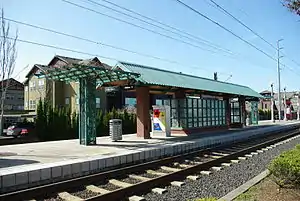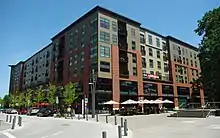Orenco station (TriMet)
Orenco, formerly Orenco/Northwest 231st Avenue, is a light rail station in Hillsboro, Oregon, United States, that is served by TriMet as part of the MAX Light Rail system. Situated between the Quatama and Hawthorn Farm stations, it is the sixth eastbound station on the Blue Line. The two-track, island platform station serves the Orenco Station neighborhood, which is considered a positive model for smart growth and transit-oriented development. The neighborhood is also home to Intel's Ronler Acres campus.
Orenco | |||||||||||
|---|---|---|---|---|---|---|---|---|---|---|---|
| MAX Light Rail station | |||||||||||
 The station's platform in 2010, then named Orenco/Northwest 231st Avenue | |||||||||||
| Location | NE Orenco Station Loop Hillsboro, Oregon, U.S. | ||||||||||
| Coordinates | 45°31′49″N 122°54′57″W | ||||||||||
| Owned by | TriMet | ||||||||||
| Line(s) | Blue Line | ||||||||||
| Platforms | 1 island platform | ||||||||||
| Tracks | 2 | ||||||||||
| Connections | |||||||||||
| Construction | |||||||||||
| Structure type | At-grade | ||||||||||
| Parking | 125 spaces[1] | ||||||||||
| Bicycle facilities | Bike and ride and racks[2] | ||||||||||
| Disabled access | Yes | ||||||||||
| History | |||||||||||
| Opened | September 12, 1998 | ||||||||||
| Previous names | Orenco/Northwest 231st Avenue (1998–2017) | ||||||||||
| Passengers | |||||||||||
| Fall 2018 | 1,297 weekday boardings[3] | ||||||||||
| Services | |||||||||||
| |||||||||||
| Location | |||||||||||

| |||||||||||
An Oregon Electric Railway (OE) depot of the same name served the nearby area in the early 20th century. The TriMet station was built as part of the Westside MAX Project, which extended MAX service from downtown Portland to downtown Hillsboro in 1998. With the city's renaming of Northwest 231st Avenue to Northeast Century Boulevard in 2017, TriMet simplified the station's name to its current form. The station includes a 125-space park and ride, a bike and ride, and a connection to TriMet bus route 47–Baseline/Evergreen.
History
.jpg.webp)
The station is named after the former company town of Orenco, a community founded in 1906 by the Salem-based Oregon Nursery Company, which purchased 1,200 acres (485.6 ha) of land in Washington County amid plans to expand operations in the Portland metropolitan area.[4][5] OE made the town a part of its branch line between Portland and Forest Grove in 1908 at the behest of the nursery,[6] laying tracks through the town and building a depot just east of where the present light rail station is located.[4] By the time Orenco incorporated in 1913, the OE depot had been averaging 1,000 passengers per month.[7][8] The outbreak of World War I the following year disrupted the nursery's plans to expand into Europe and resulted in years of financial hardship,[4][9] eventually forcing the company to file for bankruptcy and close in 1927.[9] In 1932, OE's Forest Grove branch service ceased operating due to the Great Depression and competition from automobiles.[10] The Orenco city government dissolved in 1938.[8][9]
The former town and its vicinity remained rural for decades after, becoming known primarily as a site for illegal dumping. In the 1950s, much of the area was divided and sold to development ventures, many of which failed.[11] The city of Hillsboro initiated annexation plans and consolidated land ownership with the creation of an urban renewal district in 1983.[12] Land was later sold to Intel and Pacific Realty Associates, the latter of which would eventually develop the transit-oriented, mixed-use community of Orenco Station.[13]
Planning for a light rail line extending west from Portland to Hillsboro emerged in 1979 with initial plans terminating it at 185th Avenue, east of and thus excluding the old Orenco townsite.[14] Staunch lobbying from Hillsboro Mayor Shirley Huffman and others helped to extend the planned line 6.2 miles (10.0 km) farther west through Orenco to downtown Hillsboro in July 1993.[15][16] The cost of the Hillsboro extension, estimated at $224 million, required approval for an additional $75 million of federal funding, which was granted in 1994.[17] Regional transit agency TriMet began construction of the Westside MAX in August 1993.[18] Track work between 12th Avenue and 185th Avenue in Hillsboro, the segment that included Orenco, commenced in April 1996.[19] The extension had been scheduled to open from Portland to 185th Avenue in 1997, and to Hillsboro in 1998,[17] but delays during the construction of the Robertson Tunnel pushed most of its opening back by one year.[20] Orenco station opened along with the rest of the Westside MAX on September 12, 1998.[21]
In September 2017, the station was renamed from "Orenco/Northwest 231st Avenue" to simply "Orenco", in connection with street-name changes approved by the Hillsboro City Council in October 2016.[22][23] The changes included the renaming of Northwest 231st Avenue within Hillsboro to Northeast Century Boulevard.[24]
Station details
| Platform level | Westbound | ← Blue Line toward Hatfield Government Center (Hawthorn Farm) |
| Island platform, doors will open on the left | ||
| Eastbound | → Blue Line toward Cleveland Avenue (Quatama) → | |
Located south of Northeast Cornell Road on Northeast Orenco Station Loop and west of Northeast Century Boulevard,[25] the station serves the Orenco Station neighborhood and was within TriMet's fare zone 3 until the agency discontinued all use of fare zones in 2012.[26] Designed by OTAK Inc.,[27] it features an island platform between the two tracks that consists of a shelter, ticket vending machines, and a passenger information display.[25][26] The station includes a 24-hour park and ride with 125 spaces,[1] as well as a nearby 50-space bike-and-ride facility operated by BikeLink.[2][28][29] Between the station and Northeast Cherry Drive is Plaza Park, a public plaza bounded by mid-rise, mixed-use buildings that collectively make up the Platform District.[30]
Transit-oriented development

During the light rail station's early planning stages, the city of Hillsboro and TriMet imposed high-density development restrictions, despite the opposition of existing residents. In April 1994, Hillsboro approved an interim ordinance detailing planning standards for the area within 0.5 miles (0.8 km) of the station, setting a population density goal of 45 residents per 1 acre (0.4 ha).[31] The Orenco Neighborhood Association challenged the ordinance in the Oregon Court of Appeals; the court ruled in favor of the city in July 1995. Two months later, a compromise was reached to allow granny-flat homes to be included in the zoning plans, lowering the initial density target to 34.5 residents per acre.[32]
Pacific Reality Associates, which acquired 190 acres (76.9 ha) of land near the station, developed much of the Orenco Station neighborhood.[13] In the late 1990s, the developer built 450 homes on lots averaging 4,000 square feet (372 m2), about twenty percent smaller than a typical lot at the time, with floor plans that averaged 1,700 square feet (158 m2);[13] 1,400 apartments; retail stores; and offices.[33]
The area immediately north of the station, among the last parcels of land to be filled, was approved for development in 2013.[34][35] The $120 million Platform District, developed by Holland Partners Group, features three six-story, mixed-use buildings that include more than 1,000 housing units and 20,000 square feet (1,858 m2) of retail space. The first of the three buildings, called "The Hub", was completed in February 2015.[36] At the district's center is Plaza Park, a 0.5-acre (0.2 ha) urban plaza that consists of a water feature, a colorful pergola, and a raised deck built around two white oak trees. The plaza is designed to host outdoor public events.[37][38]
Public art
Artwork at the station follows two themes: a celebration of trees and the history of Orenco. The artwork incorporates a grove of trees adjacent to the station that was preserved at the behest of the artists in charge of the artwork for the stop.[39] Individual works of art include Rings of Memory Plaza, which consists of concentric circles of granite inscribed with text by Oregon Poet Laureate Kim Stafford. Another piece is a gravel path with stone seat walls leading to an old oak grove entitled Witness Tree Rest, which includes another line by Stafford inscribed on the granite threshold at the east end of the path.[40] Grafted Path, a pathway that connects the station to Northeast Century Boulevard, illustrates the grafting method that distinguished Oregon Nursery Company trees.[27][40] East of the station is Grove of Perspective, rows of trees that create optical effects when viewed from the moving train.[40]
On the platform is a piece entitled Branch Benches, located in the passenger shelters, which are custom-made benches designed by Nancy Merritt and bracketed by wisteria-covered arbors. On top of the systems building sits a hand-forged sculpture of a tree, designed by Stuart Keeler and Michael Machnic. This weather vane spreads its roots and rises up through a nine-square grid that represents the city plan of Orenco.[40]
Services
.jpg.webp)
Orenco station is situated between the Hawthorn Farm and Quatama stations and is served by the MAX Blue Line, which runs from the station westbound to downtown Hillsboro and eastbound through Beaverton and Portland to Gresham.[41] It recorded 1,297 average weekday boardings in fall 2018.[3] Trains serve the station for approximately 22 hours per day on weekdays, 21½ hours on Saturdays, and 19½ hours on Sundays.[25][42] The headway between trains measures from as little as five minutes during weekday rush hour to 30 minutes in the early mornings and late evenings, while the majority of trains run every 15 minutes.[43] From the station, trains take thirteen minutes to reach Hatfield Government Center station in Hillsboro,[42] 39 minutes to reach the Pioneer Square stations in downtown Portland, and 92 minutes to reach Cleveland Avenue station in Gresham.[25] Orenco station also provides a connection to TriMet bus route 47–Main/Evergreen, which runs from Monday to Friday between Hillsboro Central Transit Center and the Rock Creek campus of Portland Community College.[44]
Former bus service
The station was originally served by a TriMet bus route designated 42s–Orenco ("s" for shuttle), in addition to route 47, introduced with the station's opening in 1998.[45][46] Route 42s was eliminated as a separate route in December 2001, when it was combined with route 47 but with a section along Orenco Station Parkway and Butler Road discontinued without replacement.[47]
References
- "Park & Ride Locations". TriMet. Archived from the original on August 12, 2019. Retrieved January 3, 2021.
- "Bike Parking Orenco/NW 231st Ave: 52 spaces". TriMet. Archived from the original on October 28, 2020. Retrieved January 3, 2021.
- "TriMet MAX Light Rail Passenger Census – Fall 2018" (PDF). TriMet. Archived from the original (PDF) on January 9, 2019. Retrieved January 9, 2019.
- "Historic Hillsboro Old Orenco Walking Map" (PDF). City of Hillsboro. 2013. Archived from the original (PDF) on January 8, 2019. Retrieved January 8, 2019.
- Brettman, Allan (March 23, 2016). "Historic Orenco to get a refresher -- to its street signs". The Oregonian. Archived from the original on July 3, 2016. Retrieved January 8, 2019.
- Raber, Deborah; Fitzgerald, Kimberli; Hillsboro Historic Landmarks Advisory Committee (2009). "Hillsboro (Images of America)". Arcadia Publishing. p. 80. ISBN 9780738571829. Retrieved January 3, 2021 – via Google Books.
- Slater, Frances. "A History of Orenco". Orenco Station. Archived from the original on January 8, 2019. Retrieved January 8, 2019.
- "Orenco Area History". TriMet. Archived from the original on January 8, 2019. Retrieved January 8, 2019.
- Sommers, Art (January 11, 2018). "Our County Through Time: Orenco". Washington County Museum. Archived from the original on January 18, 2019. Retrieved January 18, 2019.
- Thompson, Richard (January 1, 2008). Willamette Valley Railways. Arcadia Publishing. p. 29. ISBN 9780738571829. Retrieved September 6, 2019 – via Google Books.
- Apalategui, Eric (April 7, 1994). "Hillsboro strikes deal on lots". Hillsboro Argus.
- Beasley, Chuck; Becktel, Mark; Chiotti, Vince; Curtis, Ruth; Gao, Hong; Royce, Francie; Skidmore, Ron; Storz, Lynne (1991). The Orenco Community Plan (Report). Master of Urban and Regional Planning Workshop Projects. p. 11. Archived from the original on 2019-01-21. Retrieved 2019-01-19.
- Pulaski, Alex (November 20, 1997). "Orenco Station uses the past to develop the future". The Oregonian. p. 4.
- Hillsboro Extension of the Westside Corridor Project, Washington County: Environmental Impact Statement (Report). Federal Transit Administration. 1994. p. P1–P5. Retrieved July 29, 2018 – via Google Books.
- Hamilton, Don (February 23, 2000). "Shirley Huffman, fiery lobbyist, earns praise; Hard work and a sharp phone call put light-rail trains into downtown Hillsboro". The Oregonian. p. E2.
- Oliver, Gordon (July 29, 1993). "Tri-Met approves rail line extension". The Oregonian. p. F4.
- Oliver, Gordon (November 8, 1994). "Light-rail extension wins Clinton's support". The Oregonian. p. B8.
- Oliver, Gordon (August 8, 1993). "Groundbreaking ceremonies set to launch project". The Sunday Oregonian. "Westside Light Rail: Making Tracks" (special section), p. R1.
- Colby, Richard N. (January 11, 1996). "Work is under way in Hillsboro preparing the way for light rail". The Oregonian. p. C2.
- Hamilton, Don (August 25, 1995). "Tri-Met experiencing a holdup in the hills". The Oregonian. p. B2.
The agency [Tri-Met] says digging the tunnel for westside light rail will cause a year's delay in completing the entire project.
- Mapes, Jeff (September 13, 1998). "Gore walks tight line on Clinton". The Oregonian. p. A1.
- "TriMet expands popular frequent service bus line, adds service on four other routes". TriMet. August 23, 2017. Archived from the original on February 4, 2018. Retrieved September 15, 2017.
- Loose, Travis (October 24, 2016). "Council approves 150 street name changes". Hillsboro Tribune. Archived from the original on September 15, 2017. Retrieved September 15, 2017.
- "'Connecting Hillsboro' Address Implementation Schedule". City of Hillsboro, Oregon. January 23, 2017. Archived from the original on September 15, 2017. Retrieved September 15, 2017.
- "Stop ID 9835 – Orenco MAX Station, Eastbound". TriMet. Archived from the original on January 17, 2019. Retrieved January 17, 2019.
- "Orenco/NW 231st Ave MAX Station". TriMet. Archived from the original on September 29, 2006. Retrieved July 12, 2008.
- Colby, Richard N. (August 3, 1995). "Tracking art plans". The Oregonian. p. 1.
- "Bike & Rides". TriMet. Archived from the original on January 18, 2019. Retrieved January 18, 2019.
- "Locations – BikeLink - On-Demand Bike Parking and Bike Sharing". eLock Technologies LLC. Archived from the original on January 19, 2019. Retrieved January 18, 2019.
- Theen, Andrew (August 27, 2013). "Platform District: Hillsboro cheat sheet for the $120 million project and the Orenco public plaza design". The Oregonian. Archived from the original on January 23, 2019. Retrieved January 23, 2019.
- Colby, Richard N. (February 2, 1995). "Rural no more". The Oregonian. p. 1.
- Colby, Richard N. (September 25, 1995). "The look of the future". The Oregonian. p. B2.
- Fentress, Aaron (April 3, 1998). "Planners get Orenco's town center". The Oregonian. p. D2.
- Theen, Andrew (March 6, 2013). "Platform District could transform Orenco, and businesses are already taking notice". The Oregonian. Archived from the original on January 23, 2019. Retrieved January 23, 2019.
- Theen, Andrew (March 7, 2013). "Hillsboro council gives approval to Platform District at Orenco". The Oregonian. Archived from the original on January 23, 2019. Retrieved January 23, 2019.
- Theen, Andrew (September 29, 2014). "La Provence restaurant and Ava Roasteria cafe set for Hillsboro's Orenco development". The Oregonian. Archived from the original on January 23, 2019. Retrieved January 23, 2019.
- Theen, Andrew (August 20, 2013). "Platform District: Plaza designs revealed as developer hopes to put 'exclamation point' on Orenco Station". The Oregonian. Archived from the original on January 23, 2019. Retrieved January 23, 2019.
- Theen, Andrew (August 2, 2013). "Platform District: Hillsboro now recommends keeping 2 large oak trees near Orenco development". The Oregonian. Archived from the original on January 23, 2019. Retrieved January 23, 2019.
- Gragg, Randy (September 9, 1998). "A platform to reveal the art of the journey". The Oregonian. p. C12.
- "Art on Westside MAX Blue Line". TriMet. Archived from the original on May 9, 2018. Retrieved July 15, 2008.
- "MAX Blue Line Map and Schedule". TriMet. Archived from the original on December 15, 2018. Retrieved January 16, 2019.
- "Stop ID 9836 – Orenco MAX Station, Westbound". TriMet. Archived from the original on January 17, 2019. Retrieved January 17, 2019.
- "Frequent Service". TriMet. Archived from the original on January 9, 2019. Retrieved August 6, 2018.
- "47–Main/Evergreen". TriMet. Archived from the original on January 18, 2019. Retrieved January 18, 2019.
- Hamilton, Don (September 9, 1998). "Bus changes aim to sell commuters on using rail". The Oregonian. p. C5.
- "42s–Orenco". TriMet. 1998. Archived from the original on May 4, 1999. Retrieved March 8, 2019.
- "42s–Orenco & 47–Baseline/Evergreen & 88–Hart/198th Ave — Weekday Service Changes Begin December 3". TriMet. November 14, 2001. Archived from the original on December 2, 2001. Retrieved March 8, 2019.
External links
| Wikimedia Commons has media related to Orenco (MAX station). |